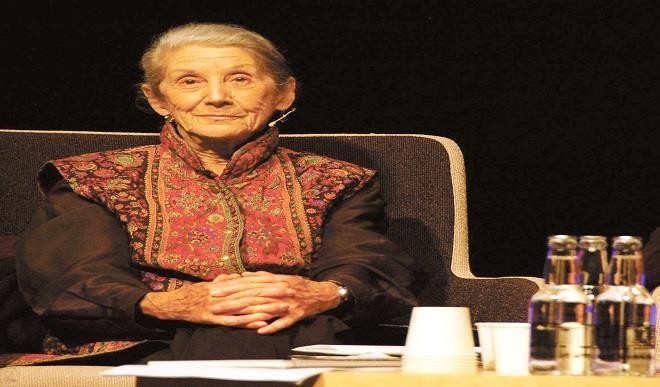Meeting Nadine Gordimer
I now accept that I am forever doomed to learning from my mistakes, whether in crafting a sentence, creating a book, or living out my life. That’s the writer’s burden. – A Igoni Barret I met Nadine Gordimer for the first and only time in Ile-Ife, Nigeria on August 25, 2006. The date is stamped […]


I now accept that I am forever doomed to learning from my mistakes, whether in crafting a sentence, creating a book, or living out my life. That’s the writer’s burden. – A Igoni Barret
I met Nadine Gordimer for the first and only time in Ile-Ife, Nigeria on August 25, 2006. The date is stamped onto the digital file of the roadside selfie I took with a friend’s camera during our stroll to the university auditorium where Gordimer and Wole Soyinka were scheduled to deliver keynote speeches at a writer’s convention. I attended the convention because my first book had just been published in Nigeria and, at the insistence of my publisher, I had brought along 200 copies, one quarter of the entire print run, to dole out in exchange for either cash or promises of press reviews, only making sure, as my publisher warned with misguided confidence, to hold back two copies to be presented to the Nobel-appointed duo. At 3:06 p.m. on my second day in Ile-Ife, this being the precise moment my face is forever frozen in a sneer by the camera lens, I had a deadweight of fifty books hanging from my right shoulder in a sturdy travel bag.
At the time and for many years afterwards, I detested my first book, From Caves of Rotten Teeth, because the cover was tasteless, the typesetting was amateurish, the print quality was an insult to quality, and the writing, most painful of all to admit, was not much better than the presentation. And yet that’s the thing I carried, the book I bore as I joined the admiring crowd that swirled around Nadine Gordimer at the close of the convention. Before that moment I had only spent a few days in her company in the pages of Loot and Other Stories, which I had picked at random from a library shelf in 2004. Before that I knew nothing about her except that she was known. Loot changed that. Her writing voice, so muscular and poised; her eccentric sentence structures; her characters, black and white, full-fleshed and well-rounded all; her unforced descriptions of the scorching sunlight, the thundering rainstorms, the colors and smells of my emotional terrain. For an emerging writer of short stories set in the African continent, Nadine Gordimer was a model and a light.
I would never tell her this, not in a crowd, not when she had no choice but to smile and bear it. But my book of short stories would be a gift that might convey the esteem in which I held her. Although, remember: I hated my book. And yet I pushed through the crowd towards that petite woman with graying hair, at last reaching her just as she bent forward to climb into the open backdoor of a waiting car. My book was grasped in my hand, but she wasn’t looking at me, she was inside the car, the door swung closed behind her, and as the driver revved the engine, she finally responded to the silent pull of my hope and turned her face to the window where I stood. With her eyes watching me, I couldn’t shove my book in her face. My limbo was broken by my friend with the camera: She snatched the book from my hand and held it through the window to Gordimer, who reached for it with an expression of curiosity that twisted into revulsion when her eyes caught the cover. The car rolled away, leaving me cold with shame.
The first and only time I got confirmation that Nadine Gordimer had read my work was in July 2013, exactly one year before she died. By this time I had finished writing my second book, Love Is Power, or Something Like That, and had asked my UK editor to send an advance copy to Gordimer in South Africa. I didn’t believe the 90-year-old maestro would read the book-especially not if she recalled the author’s name, which was unlikely. Whatever else, I needed to repair my own impressions of the gift I’d given her seven years earlier. Thus my astonishment when I got the handwritten letter she had faxed to my editor. Her alchemical scribble was hard to decipher, and her trademark syntactic flair was on full display, which made extracting a publicity quote from her note-as she herself had suggested-perhaps a harder task than necessary. No matter: Nadine Gordimer had read my book and felt strongly enough about it to write wishing me success with its publication. For many days afterwards, all I could think of was: How’s that for a second chance at a first impression?
I have learned to forgive myself for my first book. Whatever else may be said about its publication, one truth is that the experience contributed to making me the writer I am today. I now accept that I am forever doomed to learning from my mistakes, whether in crafting a sentence, creating a book, or living out my life. That’s the writer’s burden as I see it, the artist’s duty-as encapsulated in Samuel Beckett’s words: Try again. Fail again. Fail better. The only failure I acknowledge is failing to try. All else is material for my next book.
A Igoni Barrett is the author of two short-story collections and a novel entitled Blackass.
Source: Catapult
